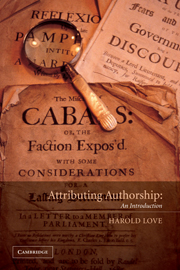Book contents
- Frontmatter
- Contents
- Acknowledgements
- List of abbreviations
- Introduction
- 1 Individuality and sameness
- 2 Historical survey
- 3 Defining authorship
- 4 External evidence
- 5 Internal evidence
- 6 Stylistic evidence
- 7 Gender and authorship
- 8 Craft and science
- 9 Bibliographical evidence
- 10 Forgery and attribution
- 11 Shakespeare and Co.
- 12 Arguing attribution
- Notes
- Select bibliography
- Index
1 - Individuality and sameness
Published online by Cambridge University Press: 22 September 2009
- Frontmatter
- Contents
- Acknowledgements
- List of abbreviations
- Introduction
- 1 Individuality and sameness
- 2 Historical survey
- 3 Defining authorship
- 4 External evidence
- 5 Internal evidence
- 6 Stylistic evidence
- 7 Gender and authorship
- 8 Craft and science
- 9 Bibliographical evidence
- 10 Forgery and attribution
- 11 Shakespeare and Co.
- 12 Arguing attribution
- Notes
- Select bibliography
- Index
Summary
The subject of attribution studies is the uniqueness of each human being and how this is enacted in writing. One determinant of uniqueness is biological: at the moment of conception a mingling of genetic information occurs which is unprecedented and unrepeatable. This mingling is partly a rule-governed and partly a random process. The rule-governed part ensures a degree of resemblance between siblings and close relatives and of uniformity over the race and species: individuality is never absolute. But then neither is it ever absent: in the most inbred of populations there will still be immeasurable possibilities of variation. Nature's poker machine never gives the same prize twice.
Even in the brains of identical twins, formed when the zygote divides after conception, tiny irregularities in the laying down of neural pathways become magnified into differences in the ways by which the brain, as a self-organising system, coordinates its vast assemblage of centres and individual neurones in the acts of knowing, speaking and writing. Experience stocks all brains with different knowledge, perceptions and attitudes. On the other hand, since language is also a shared possession with communal as well as self-expressive functions, what nature and experience individualise will often be overwritten by socialisation.
A fable may help to clarify the roles of the individual and the communal. A wise queen in ancient times established a college of philosophers.
- Type
- Chapter
- Information
- Attributing AuthorshipAn Introduction, pp. 4 - 13Publisher: Cambridge University PressPrint publication year: 2002



